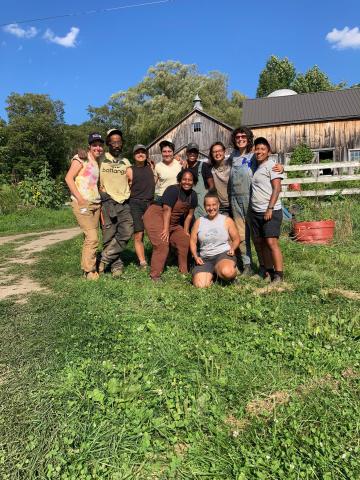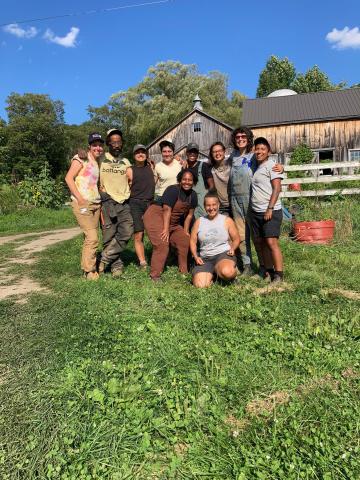Farm work is tough work—made harder for ladies and LGBTQ+ farmers who face rather more limitations and hardships throughout the native climate catastrophe. Nonetheless, they persist, and thrive.
Picture a farmer. Are you seeing a gruff white man steering his tractor between fully aligned Iowa corn rows? When you occur to have been to take a look at US Census of Agriculture information on farmer demographics, you may even be glad that that’s what farming in America seems to be like like.
The US Division of Agriculture’s Nationwide Agricultural Statistics Service conducts a census of farmland and farming communities every 5 years, nevertheless that information fails to highlight numerous these which are out throughout the space day by day. Nonetheless regardless of this lack of illustration for ladies and queer farmers who the survey fails to highlight, there are numerous unbelievable farming initiatives, farms themselves and evaluation initiatives altering the face of agriculture throughout the US and frightening others to see perform fashions in ladies and queer people like themselves.
As native climate change, institutional sexism, and discrimination disproportionately bear down on farmers and farmworkers who decide as ladies or queer, these individuals face additional challenges getting started and staying throughout the workforce than their cisgender, straight, and male counterparts. That’s the story of people who bear the brunt of these challenges, exacerbated by the native climate catastrophe, and their optimistic variations to a space marked by discrimination.
Native climate Change and Farming
The native climate catastrophe has intensified the day-to-day challenges that farmers face out throughout the fields, to start with from heat publicity. According to the American Public Effectively being Affiliation, crop staff face a extreme menace of heat-related lack of life and illness. Excessive heat critically injured virtually 80,000 US staff and killed 907 between 1992 and 2019 in step with information analyzed by Public Citizen, though consultants say heat deaths are probably under-counted. To make points worse, pickers are generally paid by the piece, like per tomato, resulting in a disincentive to take breaks, even when it’s excruciatingly scorching.
An increase in pests and evaporation from rising temperatures is leading to elevated use of pesticides. Pesticide publicity has a disproportionate impression on people who can get pregnant as it could nicely improve the pace of poor starting outcomes, developmental factors, and childhood tumors. Mónica Ramírez, authorities director of Justice for Migrant Girls, notes that analysis on farmworkers, notably in relation to pesticide publicity, have largely been centered on male farmworkers, making this affect notably powerful to quantify.
Shut-quarter dwelling poses an issue for farmworkers who haven’t any completely different selections than the farm-provided housing. Crowded conditions, a shortage of air-con in scorching climates, and an lack of capability to look at social distancing options all by covid-19 all make housing uncomfortable, compounded by rising temperatures 12 months after 12 months. Lastly, farmers and farmworkers usually lack insurance coverage protection and thus are generally excluded from cheap healthcare. This notably impacts migrant farmworkers and queer farmers who face restricted entry in rural communities.
What About Queer Farmers?
Challenges to accessing agriculture do not stop with native climate change. Markets and insurance coverage insurance policies favor straight, white male farmers. Climatic challenges are exacerbated by racism, sexism, homophobia and transphobia for ladies, LGBTQ+ farmers, and farmers of coloration. Girls farmers throughout the American West have traditionally accessed land through heterosexual relationships like marriage or inheritance, or they’ve wanted to find progressive routes to land possession, explains Jac Wypler, sociology PhD who researches queer farmers.
“Patriarchal gatekeepers make it very powerful for queer ladies to appreciate entry to land, to remain on land and to proceed their firms,” Wypler says.

in Millerton, New York.
Visibility throughout the market is one different downside as many queer farmers search to separate their public image on the farm from their sexuality and id, meaning would-be farmers who can’t decide pals may in no way be a part of the workforce.
As ladies and queer farmers are generally given the lowest-paying, least fascinating jobs, face fewer improvement options, gender-based discrimination, and customary sexual harassment, it’s not gorgeous that these groups drop out of the work drive at an alarming value, in step with the Nationwide Farm Worker Ministry. However, because of the scarcity of quite a few gender selections and sexual orientation questions in nationwide censuses, the pace at which ladies and queer individuals drop out of the workforce is simply not obtainable. Wypler is in the meanwhile working to close this information gap.
Twenty eight states wouldn’t have particular protections for victims of discrimination based on gender or sexual orientation, in employment, housing and public lodging, in step with the Freedom for All Folks advertising and marketing marketing campaign. This leaves out LGBTQ+ individuals and farmers all through the South and Midwest, largely.
No matter these many challenges, it’s truly the persistent and exclusionary farm custom that turns many queer, nonbinary and underrepresented farmers away from the sector, which makes the work of women- and LGBTQ+-owned farms the entire additional needed.
Queering Farming Fashions
Whatever the numerous obstacles ladies and marginalized people face in accessing land for his or her very personal farming operations, Rock Common Farm and Flowers obtained started in 2015 in search of to be reflective of and serve meals to the queer neighborhood they title family.
Amara Ullauri, the packages and education supervisor at Rock Common, found through speaking with queer and marginalized farmers throughout the Northeast that there are numerous queer and BIPOC individuals [Black, Indigenous, and other people of color] who lack entrance into the farming neighborhood, lots a lot much less making the enterprise of farming work long-term. Social and neighborhood limitations could be merely as restrictive to farm possession as a result of the monetary limitations. The Farm and Ranch Stress Assist Neighborhood Northeast, together with Rock Common, has launched the Northeast Queer Wellness micro-grant meant for queer and trans land stewards.
“We acknowledged many conditions of transphobia not solely throughout the workplace nevertheless throughout the surrounding neighborhood… individuals not basically involved throughout the farm,” Ullauri says regarding the evaluation that led to the grant program. “After we’re fascinated about making a safer farm home for queer and trans farmers, we’re fascinated in regards to the normal environment, the social environment, whether or not or not we may be safe after we depart the farm premises.”
The aim of this method is to help farmers entry funds to deal with their normal wellness, acknowledging that queer farmers know best recommendations on tips on how to help each other and what they need to assist themselves.
Ang Roell of They Keep Bees based mostly their apiary and group in search of to bolster the final nicely being of the environment. Drawing on the deep connection between id and agriculture, They Keep Bees offers a “queer model” of beekeeping as Roell calls it, whereby they provide completely different farmers with queen bees in a sustainable methodology. Roell calls their enterprise an alternative to the expansionist model of beekeeping which is “very deeply tied to capitalism and rapid-growth of mono crop agriculture.”
When Roell started out, they knew that they’ve been going to face resistance. Nonetheless whatever the hesitancy from farmers, They Keep Bees has blossomed, serving as an space for queer farmers to seek out out about beekeeping, engage in sustainable agriculture and uplift the voices of those traditionally omitted of the dialog.
Roell continues to hunt out strategies to extend the beekeeping family, by breaking down the heteronormative custom of farming, bringing a social media presence to agriculture and interesting youthful people all through the nation.
“I might prefer to see the census create home for queer and trans and nonbinary individuals to self-identify and title us households and farmers as a substitute of glossing over us,” Roell says. “Because of that’s a strategy that larger-scale agriculture money will get allotted.”

I might prefer to see the census create home for queer and trans and nonbinary individuals to self-identify and title us households and farmers as a substitute of glossing over us.
—Ang Roell, They Keep Bees
Changes to the System
As native climate change, the pandemic, bigotry and discrimination rage, more and more queer people, ladies, and farmers of coloration are compelled out of farming or haven’t any resolution to entry a occupation in agriculture throughout the first place, making it harder to feed a rising inhabitants. Concurrently, it is turning into harder for farmers to entry land, notably for queer individuals.
Wypler, Ullauri and Roell all contemplate the essential factor to our meals catastrophe, exacerbated by native climate change is current in assist of queer farms and farming networks. For a lot of who aren’t farmers, there are numerous strategies to assist LGBTQ+ farmers, along with:
- Vote to assist cheap housing.
- Once more the Justice for Black Farmers Act—a bill delivered to the Senate floor to supply debt assist and encourage the next know-how of Black farmers through land grants—and funds desire it for the queer neighborhood notably
- Looking for from queer and trans farmers at native markets.
- Donate to queer neighborhood networks similar to Not Our Farm, Out throughout the Open, and the Queer Farmer Neighborhood.
- Write your representatives to broaden the horizons on nondiscriminatory security authorized pointers and improve funding for marginalized demographics inside farming
Diego Velasquez is an artist, podcaster, writer, photographer, and environmental nonprofit expert based out of Moab, Utah, spending his free time climbing, mountain biking, and baking bread.
